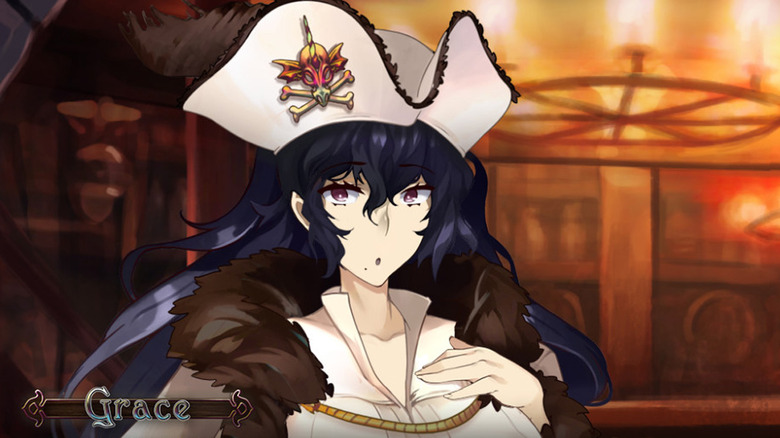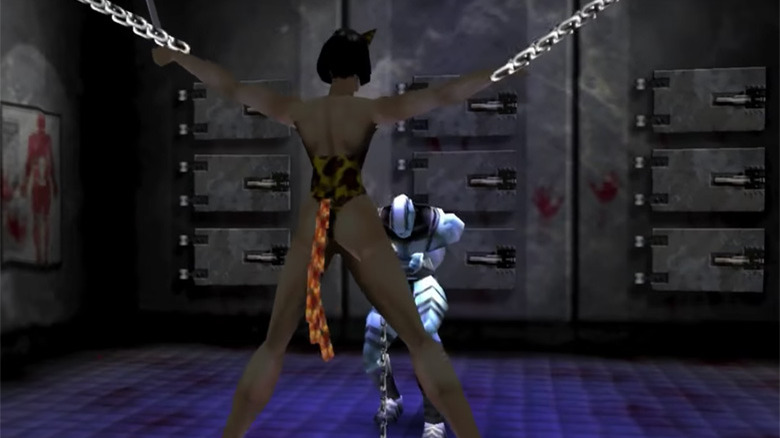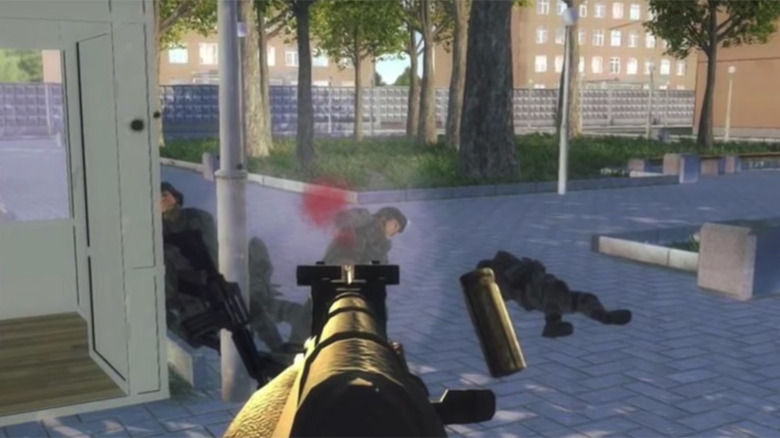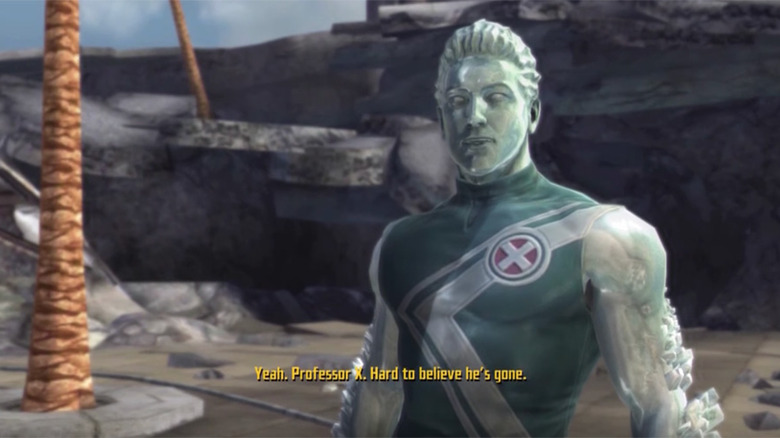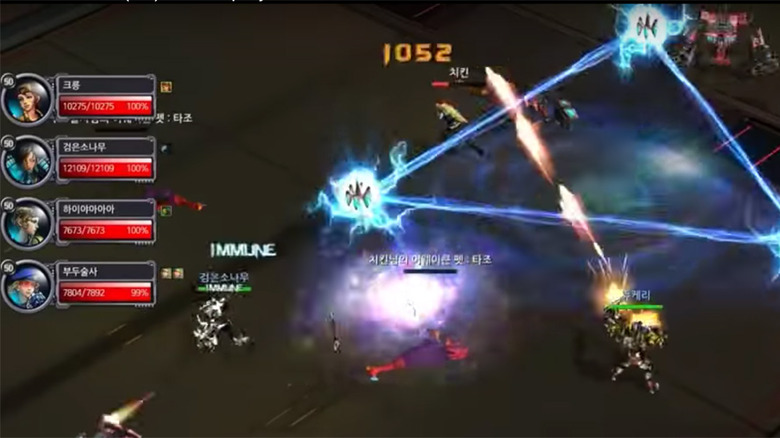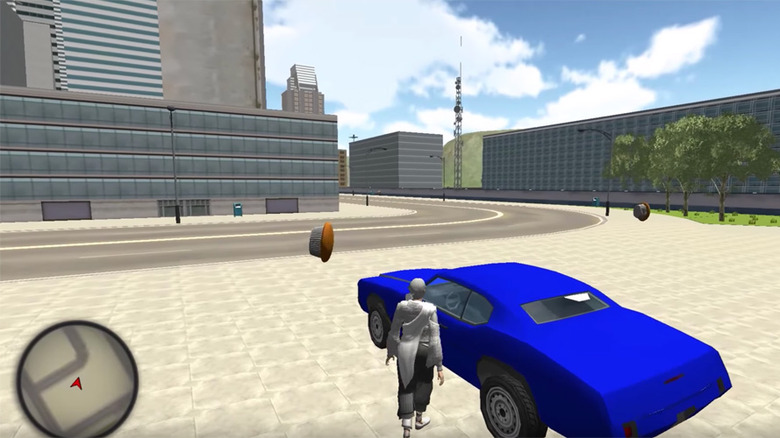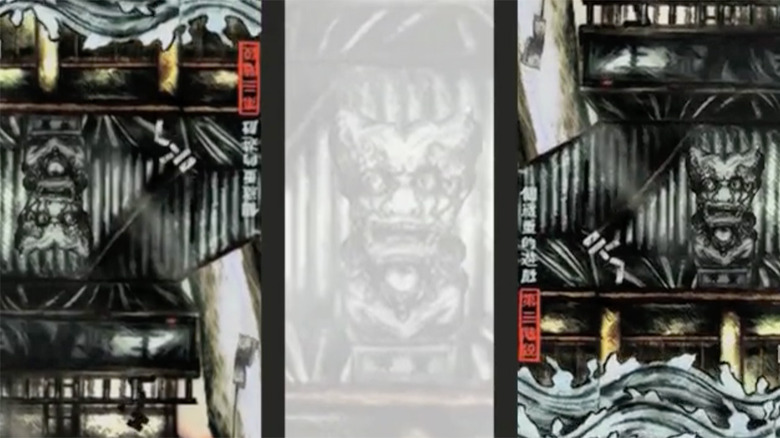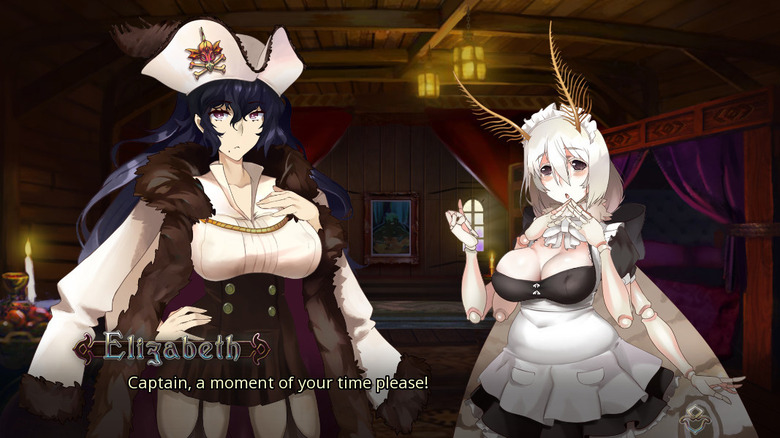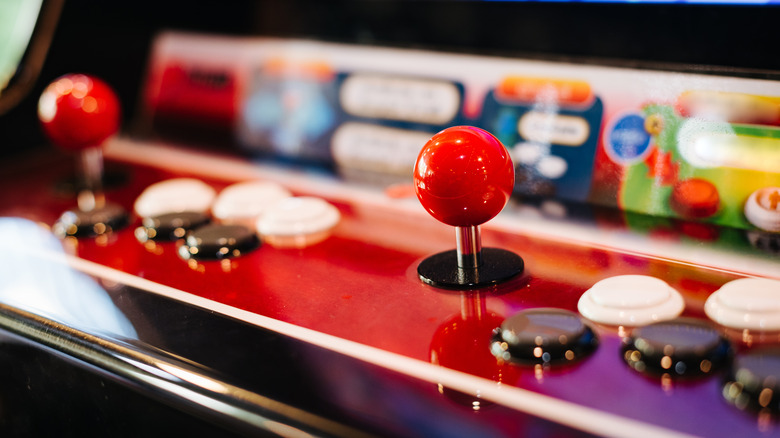Video Games That Were Banned In The USA
If there's one thing we love here in America, it's our freedom to pursue happiness in whatever way we see fit, especially when that pursuit involves rescuing Princess Peach from her various mishaps. Thanks to a 2005 Supreme Court ruling, video games are protected speech under the First Amendment, meaning that you can play whatever video games you want in this great land of ours ... unless you want to pick them up from a particular retailer.
While the government won't step in and ban a video game for anything other than a violation of the law, which does happen on occasion, that protection doesn't apply to private businesses and the choice of what games to stock. Online storefronts like Steam and the Apple App Store have handed down plenty of bans over the years, and it's often for a pretty good reason. From the controversial titles that stirred up understandable outrage to legal issues that caused titles to be recalled, here are the video games that were banned in the good ol' USA.
Thrill Kill was just a bit too thrilling
In the mid-'90s, Mortal Kombat set the standard for ultra-violent fighting games. Despite worries that impressionable youngsters were going to become fire-breathing lizard ninjas themselves, it was also a huge success that spawned an entire roster of imitators. The most infamous Mortal Knockoff was Thrill Kill, which is pretty impressive when you consider that the game never actually came out.
There were actually a lot of interesting ideas, including a four-player setup and a combat system geared towards doing damage rather than avoiding it, which basically makes it the graphically violent 1998 equivalent of Super Smash Bros. Unfortunately, those mechanics never got any attention, because the major selling point touted by Paradox and EA was the bloody cast of serial killers, cannibals, and a suicidal dominatrix murdering each other to get out of Hell.
With that much blood and sexual content, Thrill Kill was given the ESRB's "Adults Only" rating, which in turn caused EA to cancel it only weeks before its intended release date rather than court the controversy. It did, however, live on in some form. Since the game was completed — and leaked by a few of its developers — it was widely distributed as a bootleg title, and the same engine was used to make Wu-Tang: Shaolin Style the following year.
The Guy Game forgot to ask for ID
If you watched a lot of late-night TV in the early 2000s, you undoubtedly remember Girls Gone Wild, the extremely sketchy video series where women were invited to take their shirts off for the benefit of ... well, people who watched a lot of late-night TV in the early 2000s. At least a few of those people undoubtedly went on to found (oh boy) Top Heavy Studios, where they ripped off GGW for an even sketchier project: The Guy Game.
The idea was combining GGW-style footage of women on spring break in San Padre Island with a trivia game. The twist? The player doesn't actually partake in the game, you just guess whether the women being featured are going to get the questions right or wrong. Who wouldn't love that?
It turns out that an awful lot of people did not, in fact, love it. The big problem, though — or at least the biggest among its many, many problems — came in the form of a lawsuit from one of the participants who claimed that not only had she not been informed that the footage would be used for a game, she was also 17 years old at the time of filming. In the court case that followed, a judge understandably ordered all copies recalled from the stores that were foolish enough to stock them in the first place.
Active Shooter offended everyone
Active Shooter is exactly what it sounds like: a first-person shooter where players take on the role of a gunman or a S.W.A.T. team member during a school shooting, keeping track of civilians and police killed by the player. The problem here should be pretty obvious, but given that the game was released through Steam on in May of 2018, just months after the Stoneman Douglas High School shooting in Parkland, Florida — and several similar incidents — it also shouldn't be surprising that outcry from consumers included the parents of children involved in real-life mass shootings.
In response, Valve delisted Active Shooter from the Steam online store, referring to developer Ata Berdiyev as "a troll, with a history of customer abuse, publishing copyrighted material, and user review manipulation." Several users also cited Berdiyev's history of low-quality games, including Zucc Simulator and White Power: Pure Voltage, which, despite the name, is actually a weird knockoff of Stranger Things, but as a driving simulator.
For his part, Berdiyev responded to the game being banned from Steam by citing other violent games like Carmageddon and Postal that have been sold by Steam without incident, claiming that they were "even worst [sic] compared to Active Shooter and literally focuses on mass shootings/killings of people," and self-publisehd it under a new title, Standoff.
The courts were more powerful than the mutants of X-Men: Destiny
An action-RPG based on the X-Men seems like it should be a sure thing. For X-Men: Destiny, however, that didn't really happen — and not just because of reviews like Engadget's, which blasted the game as being "a careless, cynical, opportunistic mess" that was less enjoyable than "burying a beloved family pet." Somebody get Bobby Drake in here, 'cause we need ice for that burn.
The real problems came behind the scenes, thanks to conflicts between the developers at Silicon Knights and Epic Games. In 2007, the devs launched a lawsuit against Epic for breach of contract, claiming that they were "sabotaging efforts by Silicon Knights and others to develop their own video games" by failing to provide them with a functioning version of the Unreal 3 Engine.
A few years later, it turned out that Silicon Knights had gotten their hands on the engine despite Epic's alleged unwillingness to deliver on their part of the contract. While they initially claimed that they'd developed a new engine for X-Men: Destiny and the sci-fi Norse mythology title Too Human, a North Carolina court found in 2012 that they'd actually just used Unreal 3 in breach of contract. All copies of both games, along with a handful of titles that were still in development, were ordered to be recalled and destroyed, and Silicon Knights was hit with $9.2 million in damages, leading to the studio's bankruptcy in 2014.
Wild Busters got great reviews ... from the people who made it
While the studios behind AAA games are secure in the knowledge that there's a massive, built-in fan base that's always going to show up on day one, smaller studios often rely on reviews to spread the word about their games. They're so important, in fact, that it's not entirely uncommon to find out that a developer has been trying to manipulate reviews for their own gain.
That's what happened with Wild Buster, an MMO published by Insel Games in February of 2018. After it was released, the CEO reportedly sent out an email to the staff, asking them to buy copies on Steam, for which they would be reimbursed, and leave positive reviews in order to get some positive buzz going for the game. The email even ended with: "Neglecting the importance of reviews will ultimately cost jobs."
Unfortunately, the plan had the exact opposite effect. After the email was leaked to Reddit, Steam investigated and wound up banning the publisher from the platform, cutting off a huge market for Wild Busters and Insel's other games. The publisher would later issue a statement claiming that they really just meant that people should "review" the game for, you know, their friends and family, but nobody bought that line, either.
Granny Theft Auto won't make Rockstar lose any sleep
The story of Granny Theft Auto being delisted from the Microsoft Store seems pretty simple. It was originally uploaded as part of the Xbox Live Creators Program, which allowed any developer to publish a game for Xbox One and Windows 10 with "a simplified certification process and no concept approval required," in an effort to build up a library of quirky indie games. Later, it was taken down along with every other game released by its publisher, Archor Games, presumably because they included copyrighted music. Which, in this case, was a MIDI of "Uptown Funk."
What makes Granny Theft Auto notable is ... well, literally everything else about it. The entire Archor Games library — released by an Xbox One user named ECHS BACHS — is full of low-res fever dreams. Granny Theft Auto, for instance, is a weird "open world" driving game in the style of, well, Grand Theft Auto, except that you mostly drive around looking for gigantic rotating pies. It's just the tip of the iceberg, too: Bazook-a-Bear Workshop involved running around in a maze shooting at stuffed teddy bears with a bazooka, and The Simps is sort of like The Sims, except vaguely nightmarish and genuinely upsetting.
The kicker? While GTA (no, not that one, the one with the granny) was technically for sale through the Microsoft store, it was offered up to players for all of four cents.
Mobile games about the hell that is mobile phone production
Here's a good way to get banned from Apple's ubiquitous App Store: make a game about the controversies surrounding the conditions in which Apple products are actually made, including the infamous suicides of workers in Shenzhen's Foxconn industrial park.
Benjamin Poynter's In A Permanent Save State used the Foxconn suicides as the basis for a surreal story that followed the souls of seven workers at an unnamed producer of electronics. As the trailer says, "In pursuit of a better life, they committed suicide as a means of escaping building these devices." It turned out that a game about workers trapped even after their deaths in a factory that makes iPhones didn't really sit well with Apple, who removed the game from the App Store in 2012.
If Save State used the real-life incident as inspiration for a surreal narrative, however, Phone Story had no such illusions. It was a direct and brutal satire produced by Mollieindustria. It was removed from the App Store for "objectionable or crude content," which the developer said was far less objectionable than the real-life conditions they were drawing attention to. Among other things, it included a minigame where you were tasked with catching workers as they attempted to jump to their deaths, and when the player died, the game displayed, "Don't pretend you are not complicit." While they were banned by Apple, both games are still available for Android.
Mutiny!! had extreme nudity
As near as we can tell, Mutiny!! is an erotic visual novel about an airship crewed by a group of lady pirates who are also animal- or insect-human hybrids, like, for instance, a distressingly busty moth with four arms. You know, standard video game stuff. Needless to say, the game also involves a heavy amount of what Polygon called "extreme nudity," but that's not actually that unusual either.
In May of 2018, however, Mutiny!! and a few other titles were singled out for threats of removal owing to "reports of pornographic content," which came as a shock to developers who had been selling their games just fine before that. The difference this time around, however, likely stemmed from the controversy surrounding Active Shooter, which caused Valve to re-examine their content policies. By June, they had walked back threats of removing Mutiny!!, instead deciding that they'd let anything go as long as it wasn't "illegal, or straight up trolling."
Rather than run into any further trouble, however, the developers at Lupiesoft elected to leave a somewhat censored version on Steam ... while also offering a patch that made it completely uncensored for players to download at their website.
Every single arcade game was banned (in Marshfield, MA)
When you think about video games that are likely to be banned, it's usually the ones with hardcore violence or sexual content that come to mind, and most of them tend to be more recent. The town of Marshfield, Massachusetts, however, dropped the hammer on arcade games with a city-wide ban. And here's the weird part: it wasn't Mortal Kombat or Killer Instinct or even Lethal Enforcers that prompted the ban. It happened in 1982.
You might think that it's pretty difficult to find something so offensive in a game like Space Invaders or Pac-Man that legal action would be required, although to be fair, the latter does include a fully nude protagonist. The citizens of Marshfield, though, were so worried that children would take to a life of crime in order to support their video game addictions, that they expanded a 1972 ban on all "coin-operated amusements" to include arcade games. The ban was even upheld by the Massachusetts Supreme Judicial Court, presumably after hearing stories of kids who would steal quarters from their parents just to get a hit of that sweet, sweet Donkey Kong high.
Fortunately for Marshfield's gamers, the law was finally repealed in 2011, meaning that they no longer had to drive 90 minutes to Boston and the nearest Chuck E. Cheese just to get some Skee-Ball in. Congratulations, Marshfield, and believe us: check out this thing called Street Fighter. It's gonna blow your mind.

